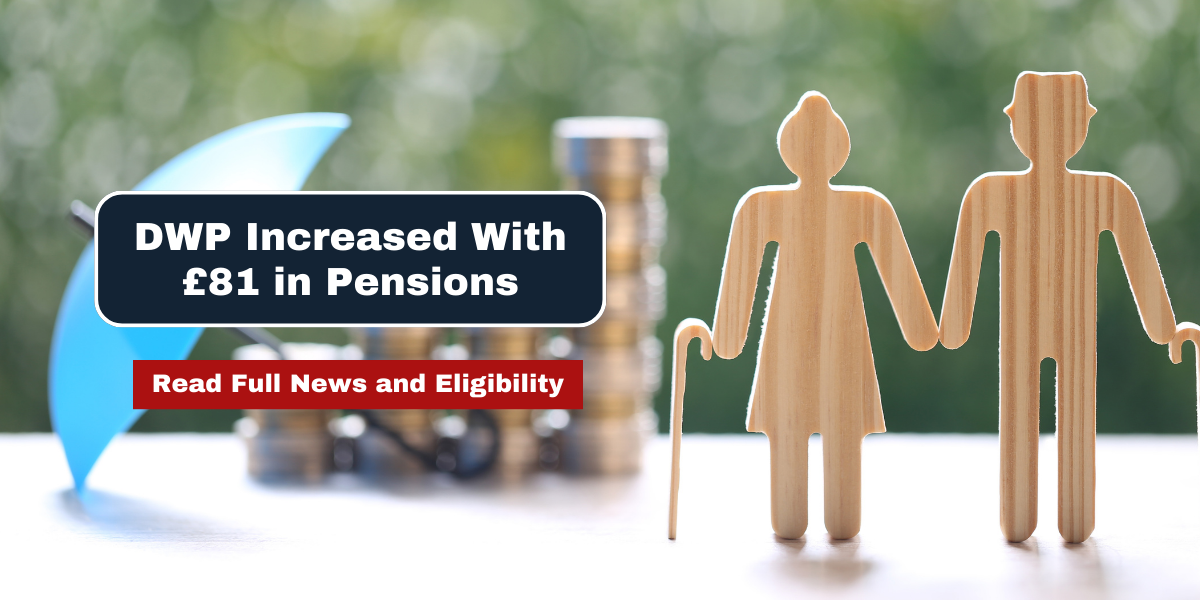The recent announcement of DWP Increased With £81 in Pensions and Disability Benefits marks a crucial development for many in the UK. This significant boost is set to enhance financial stability for elderly and disabled individuals, offering much-needed support in challenging times. The increase applies to both Pension Credit and Personal Independence Payment (PIP), reflecting the government’s commitment to addressing the needs of those facing financial difficulties due to age or disability.
This adjustment not only helps cover essential living and housing costs but also underscores a broader dedication to improving the well-being of vulnerable communities. This change is a vital step toward ensuring a more secure and supportive environment for those who need it most.
Table of Contents
Increase in Pensions and Disability Benefits
The allocation for disability benefits will rise by 81 euros for up to six million recipients. If you have a disability, illness, or mental health issue, you might qualify for Personal Independence Payment (PIP). Pensions and Disability Benefits offer additional financial support.
Under constitutional requirements, the Department for Work and Pensions (DWP) must increase PIP annually in April to match inflation. Consequently, the government announced in November’s Autumn Statement that starting April 2024, disability compensation will see an extra 6.7% increase.
If you are not terminally ill, PIP may be disbursed weekly. Typically, PIP is paid directly into your bank account every four weeks. For more details on the £81 increase in pensions and disability benefits in the UK, please refer to this post.
| Dwp Universal Credit News 2024 |
| Snapchat Class Action Settlement 2024 |
| Social Security Disability Benefits Pay Chart 2024 |
| Australia Minimum Pension |
| 1907 Social Security |
Understanding PIP Benefits UK
If you have a disability, a severe physical or mental health condition, or face challenges with certain daily tasks, PIP can assist with increased living expenses. PIP is divided into two categories: daily living and mobility.
In other words, PIP is tax-free and does not require a means test, meaning your eligibility is not affected by your employment status or financial situation.
Typically, PIP claims made after reaching State Pension age are awarded as “indefinite awards,” with no fixed end date. However, your claim will be reviewed periodically to confirm your continued eligibility and adherence to any updated procedures.
Increase in Pensions and Disability Benefits Overview
| Post Theme | £81 Increase in Pensions and Disability Benefits in UK |
| Country | United Kingdom |
| Increase Percentage | 6.7-10% |
| Dependent on | Inflation |
| Eligible Age | Between 16 years and State Pension Age |
| More Details | Find Here |
£81 Increase in Pensions and Disability Benefits in the UK
Positive news has emerged regarding a potential additional weekly increase of £81.50, up from the current £76.40. This extra pension credit is anticipated to rise in April. For the fiscal year 2023–2024, several benefits have been adjusted by 10.1% to match inflation.
The UK government has announced that pensions and disability payments will increase by £81. Seniors, as well as those receiving the highest-rate care component of disability living allowance, will see a significant boost in their personal independence payment (PIP) funding next year.
Who is eligible for Pensions and Disability Benefits in UK
To qualify for Personal Independence Payment (PIP), you must be over 16 but under the State Pension age. Additionally, you need to be disabled or have a medical condition that significantly impacts your daily living or mobility.
Exceptions apply if you have a terminal illness with a life expectancy of six months or less. Otherwise, you must have been experiencing these difficulties for at least three months and expect them to continue for at least another nine months.
Significance of Increase in Pensions and Disability Benefits
This increase is significant as it provides families with crucial support, enhancing financial stability and offering more than just numerical adjustments. It reflects a commitment to aiding these communities and recognizes the challenges faced by the elderly and disabled.
Pension credit does more than simply provide additional funds to those above the State Pension age; it offers essential financial assistance to individuals with low incomes. It helps cover necessary living expenses, including housing costs such as utilities or ground rent, and supports caregivers of those with severe disabilities.
We are pleased you’ve visited our portal to learn about the £81 increase in pensions and disability benefits in the UK. Please continue to check back for further updates.
Conclusion
The £81 increase in pensions and disability benefits represents a significant boost in financial support for those in need. It highlights the government’s commitment to improving the lives of elderly and disabled individuals, acknowledging their ongoing challenges. With this adjustment, Pension Credit and Personal Independence Payment will provide enhanced assistance, covering essential living and housing costs. This change is more than a mere figure; it’s a vital step toward better financial stability and support for vulnerable communities.
FAQs
What is the £81 increase in pensions and disability benefits?
The £81 increase refers to the additional amount added to pensions and disability benefits in the UK, starting from April 2024, to help improve financial support for recipients.
Who is eligible for the Personal Independence Payment (PIP)?
To be eligible for PIP, you must be over 16 but under the State Pension age, and have a disability or medical condition that affects your daily living or mobility.
How often is Pension Credit paid?
Pension Credit is typically paid every four weeks directly into your bank account.






